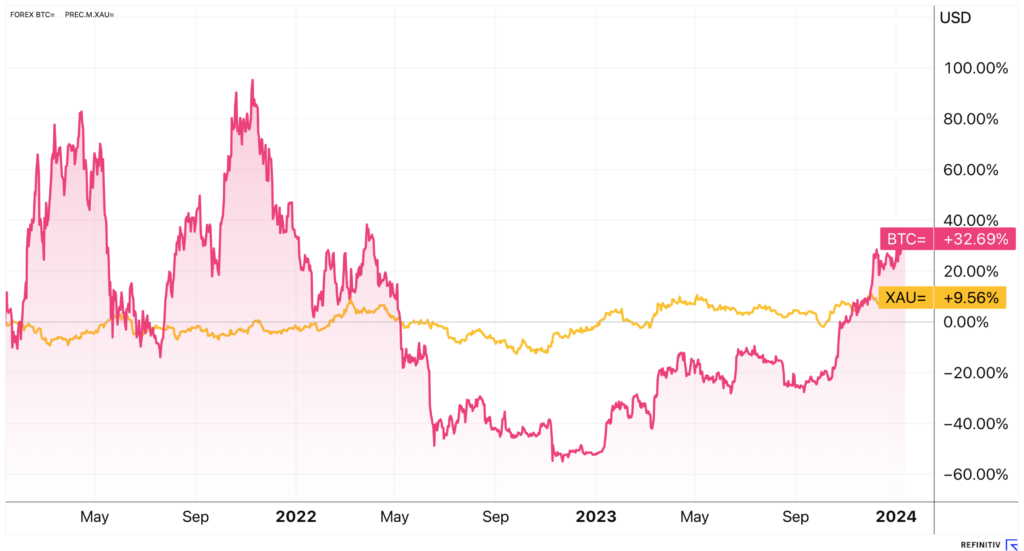Special note due to the subject matter: this article discusses high risk investments. Everything in this article should be considered general information only, and not personalised financial advice. We strongly recommend seeking professional, personal financial advice that takes into account your personal situation and risk tolerance before making any major financial decisions, including making investments (hit the Contact Us link at the bottom of this page if this is something you’d like to discuss). Nothing in this article should be considered an endorsement or recommendation of any particular investment or investment manager.
The U.S. Securities and Exchange Commission (SEC) this week made the significant decision of approving Bitcoin exchange-traded funds (ETFs), marking a pivotal moment in the mainstream financial adoption of cryptocurrencies. This approval comes after a decade-long journey of regulatory hurdles and intense scrutiny by the SEC and was largely done against their will – they were essentially forced into the decision as the result of a lawsuit involving Grayscale Investments, a major player in the cryptocurrency industry. The lawsuit revolved around the SEC’s decision-making process and its reasons for denying Grayscales’s application for a Bitcoin ETF, found by a federal appeals court to have been arbitrary and capricious, a decision that the SEC decided not to appeal.

Despite SEC approving the funds, chairman Gary Gensler is clearly still sceptical, reminding investors the decision was not an endorsement:
Bitcoin is “primarily a speculative, volatile asset, that’s also used for illicit activity, including ransomware, money laundering, sanction evasion, and terrorist financing,” he said. “Investors should remain cautious about the myriad risks associated with bitcoin and products whose value is tied to crypto.”
What do Bitcoin ETFs mean for Investors?
On January the 10th, the SEC approved 11 proposals from issuers including BlackRock, Fidelity and Grayscale, among others, to launch spot bitcoin ETFs. They started trading on January the 11th, with around $4.6Bn of shares traded that day. So what does the availability of Bitcoin spot ETFs mean for investors?
Broadened Access to Bitcoin
The SEC’s decision dramatically broadens access to Bitcoin for investors. Prior to Bitcoin ETFs being available, investors could certainly hold cryptocurrencies directly, through wallets or Crypto exchanges. But these have been technically difficult for many to access, and have been suffering a raft of cases of fraud, theft, and outright collapses in the last several years. Bitcoin ETFs, similar to mutual funds, offer a more straightforward way for investors to gain exposure to Bitcoin without directly purchasing and holding the cryptocurrency.
Potential Market Growth
With the introduction of Bitcoin ETFs, the $900 billion Bitcoin market is now open to everyday investors. This could potentially lead to increased market growth and more widespread adoption of Bitcoin as a financial asset.
With the legitimacy conferred by the SEC’s approval (even if the SEC has been clear they don’t endorse the underlying Bitcoin assets themselves), institutional interest in Bitcoin is likely to increase, attracted by the first genuinely new financial instrument to be made available to retain investors in some time – and the associated management fees. Financial advisors and institutions now have the opportunity to buy exposure to Bitcoin in a regulated and familiar fashion, which could lead to greater institutional investment in the cryptocurrency.
Price Impact
Following the SEC’s decision, Bitcoin’s price saw a notable increase, indicating a positive market reaction to the news. This response reflects the market’s anticipation of increased investment flows into Bitcoin due to the ease of investment through ETFs.
Some strategists have suggested that prices could continue to grow as retail and institutional funds flow into the new funds. Many have pointed to the price performance of gold when retail spot gold funds became more widespread as a historical parallel.
Bitcoin’s as a store of value or inflation hedge
Gold has been a recognized store of value for centuries and has proven its worth during times of economic uncertainty. Its tangible nature, allowing physical possession, adds to its perceived security. Gold’s long-standing global market and liquidity contribute to its popularity as an inflation hedge.
Bitcoin doesn’t have the same historical track record as gold – it is relatively liquid, but also highly volatile. Bitcoin’s value is primarily based on its ability to be traded and is not backed by any physical asset, making its valuation more speculative. Bitcoin’s supply is fixed and limited, which theoretically makes it a good inflation hedge – however, Bitcoin has experienced significant price fluctuations, challenging its role as a reliable store of value.

Gold has shown resilience and stability during economic downturns and periods of high inflation in the past. Bitcoin, being a very new investment, has yet to establish a consistent performance record during inflationary periods, and in the past three years has shown to be just as volatile, if not more so, than equities.
What Risks do Investors need to Be Aware Of?
We are firmly of the view that Bitcoin or any other crypto markets investment is high-risk, with most assets displaying high levels of volatility over short timeframes and a significant risk of permanent loss of capital. The higher standard of governance that comes from being listed will likely be positive for Bitcoin – however there are still a raft of risks that investors should be mindful of.
Volatility and Speculation
Despite the SEC’s approval, the commission’s chair, Gary Gensler, warned that Bitcoin remains a speculative and volatile asset. Investors should be cautious of the risks associated with Bitcoin and products tied to its value. The chart above shows just how volatile Bitcoin has been in the past three years, and Bitcoin shows high levels of correlation with equities as well as seemingly high sensitivity to interest rates – both characteristics that make it less attractive as a hedge against inflation.
Potential for Market Manipulation
There are concerns about the underlying Bitcoin markets being marred by fraud and manipulation. Investors should be aware of these risks and the potential impact on their investments – even if they can’t necessarily protect against them. Bitcoin ETFs may help improve efficient and transparent market operation and reduce opportunity for manipulation over time.
To address market manipulation concerns, Nasdaq and CBOE have created a market surveillance mechanism with Coinbase, the largest U.S. cryptocurrency exchange.
Regulatory Uncertainty
The cryptocurrency market is still evolving, and regulatory landscapes can change. Investors should stay informed about potential regulatory changes that could impact Bitcoin ETFs. New Zealand investors in particular should be careful of investing in securities or assets that are not offered directly to retail investors here, and not regulated by the New Zealand Financial Markets Authority, as they offer little to no investor protection to New Zealanders and are not obligated to comply with New Zealand financial laws.
Hacking and Security Concerns
The approval process of Bitcoin ETFs saw some last minute controversy, with a hack of the SEC’s X (previously Twitter) account that falsely indicated early approval of the ETFs. This incident highlights the ongoing cybersecurity risks associated with digital assets, including frequent hacks of exchanges and crypto wallet stores.
Bitcoin ETFs are likely to reduce cybersecurity risk and risk of theft, as storage and management of assets are handled by large, sophisticated, and established fund managers who are subject to SEC regulation (unlike many of the Bitcoin exchanges that have collapsed in the last 2 years) but investors should be aware of more broad security risks to cryptocurrencies.
Our Take
We’re only in the second day of Bitcoin ETFs being publicly traded in the US. Right now, the only way for New Zealand investors to access these products is by buying them directly in the US via international securities brokers, and funds accessed this way have limited protection for New Zealand investors.
We consider crypto investments as a category to be at the highest end of the investment risk spectrum. Exchange-traded funds issued and managed by large, well-established and reputable fund managers such as Fidelity and Blackrock will bring a level of legitimacy to the asset class, and while the mere involvement of fund managers such as these gives no further guarantees as to performance, it seems likely that they will at bring a higher standard of governance and risk management to the table.
Given crypto’s extreme volatility, lack of value underpinned by tangible assets or cashflows, and overall speculative nature, we’re still of the view that investment in the space is the next best thing to gambling. We have no plans at this stage to include crypto exposure in our client portfolios, although as with any type of investment we’ll continue to watch how the space evolves.
If over time there does develop a strong thesis for inclusion in portfolios – perhaps sitting alongside more traditional commodities, or inflation hedging assets such as gold – then we’ll re-evaluate. At this stage, we suggest that to anyone considering investing in crypto assets that they keep their exposure to a minimal share of their overall portfolio and treat it as a speculative investment they won’t be materially impacted by if they lose it all.
The SEC’s approval of Bitcoin ETFs is a watershed moment, offering a new asset class for investment – something that doesn’t happen every day! – but also accompanied by significant risks. Investors should exercise a high level of care and attention when considering how these fit into their portfolios, and be well aware of the potential for loss.
Ready to get in touch?
Get in touch now for a free no-obligation chat about how we can support you and your investment needs.
